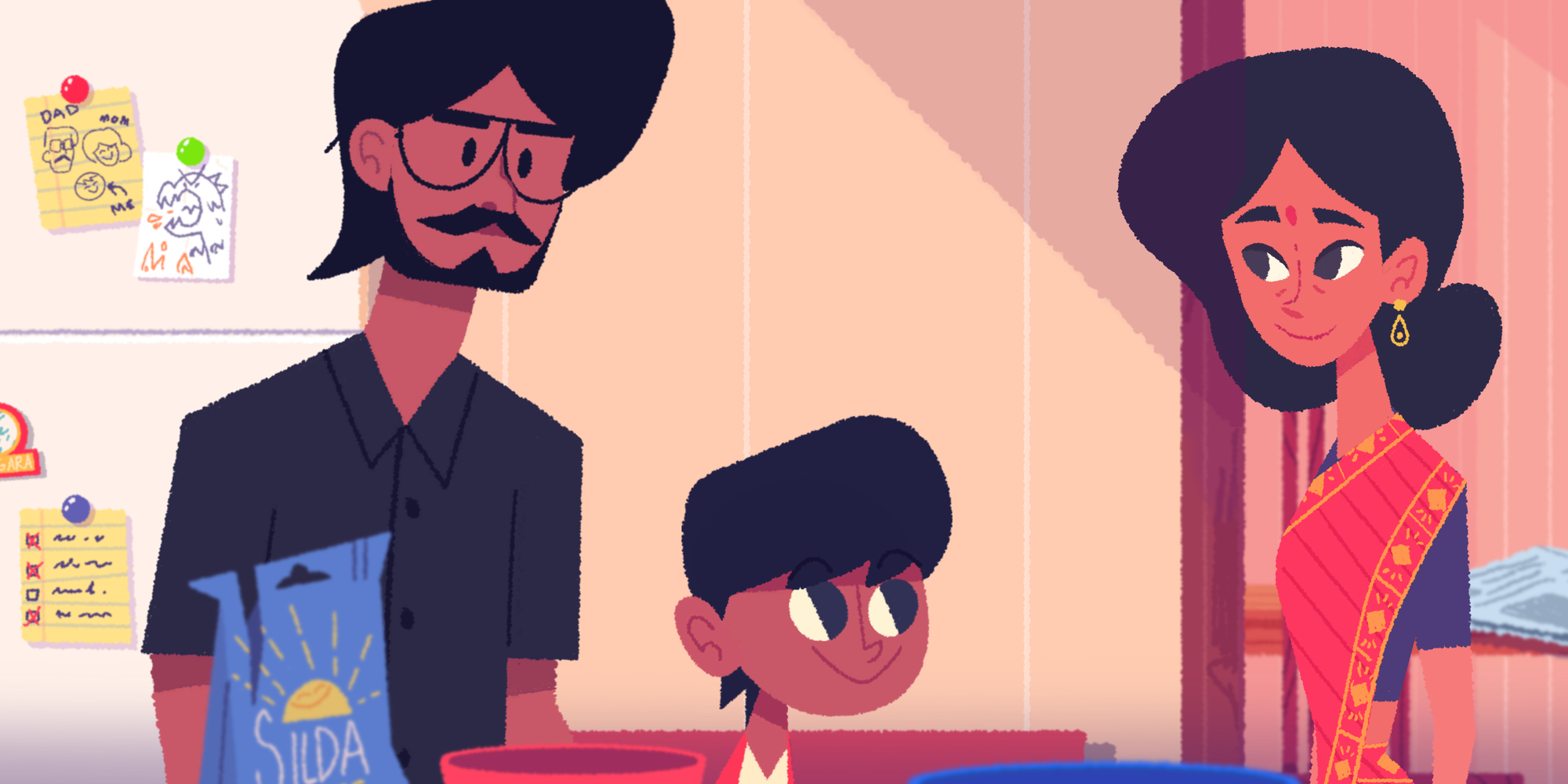If you have immigrant family members like me, Venba is a heart-wrenching game that had me sniffling by the end. The game is short and very bittersweet, centering on Venba, a Tamil woman who emigrates to Canada with her husband in the 1980s. You follow her through decades of her life, as she has her son Kavin, struggles with the challenges of living in a foreign country, and eventually into old age.
The game’s central conflict is that Kavin, her son, is growing up ashamed of his heritage. He wants badly to assimilate, too embarrassed to eat his Indian lunches at school and going by ‘Kevin’ so he fits in better. It’s an all-too-common phenomenon, and Venba accurately reflects the pain of being othered and feeling the need to minimise parts of your identity in order to feel like you belong. It also touches, with surprising incisiveness, on the complexities of gender roles and motherhood, and how those things are subtly racialised despite being very universal experiences.
Some of the gameplay revolves around conversations she has with her family, but most of it is cooking. Venba has a recipe book inherited from her mother that she brought with her when she moved, but many of the pages are damaged – you will have to use some minor guesswork in order to figure out how to cook the dishes Venba is making. If you can’t figure it out, you can ask for hints. There’s very little cooking in the game despite it marketing itself as short narrative cooking game, but the gameplay that is there is varied and interesting. There’s a memory mechanic, where instead of a recipe you puzzle it out according to Venba’s memories, which is an interesting twist on what could otherwise become a boring mechanic. Cooking as Kavin later in the game will have you trying to piece together recipes from his mistranslations, which does a great job of recreating what it’s like to struggle with a second language.
That last part is particularly important, because Venba focuses a lot on the loss of language that often happens when Asians move to Western countries. I myself have a fraught relationship with the languages my grandparents speak, and that disconnect is well illustrated in Venba. We see the world through Venba’s eyes for much of the game, which means when she listens to her son speaking English, much of it is unclear and obscure. The visual representation of this is that sometimes when he speaks, his speech bubbles are muddied, so it’s a little harder to figure out what he’s saying. It’s just one of the little details of the game I found so interesting – it’s clear there was a lot of care and thought put into the game’s design considerations.
What’s so touching about Venba for me, someone of Indian heritage, is just how unashamedly and proudly Tamil it is, despite the game being largely about the immigrant experience of feeling a need to reject your racial identity. It’s rare to see games that cater so directly to this niche, and I can’t help but love it. The love of Tamil culture reverberates through every little detail of this game. You cook delicious Tamil food, yes, and your stomach may rumble like mine at the mention of layered biryani, but the Tamil inspiration stretches far beyond that.
As I discussed in my preview, the character design for Paavalan, Venba’s husband, is heavily influenced by legendary Tamil actor Rajinikanth and the game references iconic Tamil movies like Perazhagan. The music, especially, blew me away, with each song composed to pay homage to a specific Tamil cinematic director, and performed by South Asian artists. Even the sound design felt Indian – the jingling of Venba’s bangles as she walks around the house is so reminiscent of my own grandmother.
Venba is a truly wonderful game, and executes what it sets out to do wonderfully. The art is gorgeous, the music is excellent, and the storytelling is somehow both broad in what it manages to elucidate about the South Asian immigrant experience while deep in the family dynamics it portrays. The cooking gameplay does eventually get a little stale towards the end as it attempts to include more recipes with less detail, and quite honestly, it’s more of a visual novel that touches on cooking than an actual cooking game. That said, I still found myself sniffling and wiping tears away by the end. It’s a sincere, full-throated love letter to Tamil culture and first-generation immigrants everywhere, and in that sense it is unique and singular in its ambition. I loved Venba, and have already recommended it to my Indian friends. I can only hope that it reaches far beyond that audience.
Score: 4/5. A game code for Nintendo Switch was provided.




